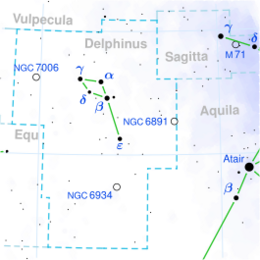Astronomy:Zeta Delphini
| Observation data Equinox J2000.0]] (ICRS) | |
|---|---|
| Constellation | Delphinus |
| Right ascension | 20h 35m 18.53563s[1] |
| Declination | +14° 40′ 27.1675″[1] |
| Apparent magnitude (V) | +4.647[2] |
| Characteristics | |
| Spectral type | A3Va / L5[3] |
| U−B color index | +0.14[4] |
| B−V color index | +0.105[4] |
| Astrometry | |
| Radial velocity (Rv) | −25 ± 2[5] km/s |
| Proper motion (μ) | RA: 45.52[1] mas/yr Dec.: 11.74[1] mas/yr |
| Parallax (π) | 14.82 ± 0.23[1] mas |
| Distance | 220 ± 3 ly (67 ± 1 pc) |
| Absolute bolometric magnitude (Mbol) | 0.523 / 14.59[3] |
| Details[3] | |
| ζ Del A | |
| Mass | 2.5 ± 0.2 M☉ |
| Luminosity | 48.63 ± 1.66 L☉ |
| Surface gravity (log g) | 3.72 cgs |
| Temperature | 8336 K |
| Metallicity [Fe/H] | −0.05 dex |
| Age | 525 ± 125 Myr |
| ζ Del B | |
| Mass | 55 ± 10 MJup |
| Luminosity | 0.00012 ± 0.00001 L☉ |
| Surface gravity (log g) | 5.0+0.5 −1.0 cgs |
| Temperature | 1550+250 −100 K |
| Age | 525 ± 125 Myr |
| Other designations | |
| Database references | |
| SIMBAD | ζ Del |
| ζ Del B | |
Zeta Delphini (ζ Delphini) is a star in the constellation of Delphinus. With an apparent magnitude of about 4.6,[2] it is faintly visible to the naked eye. Parallax measurements of the system made by the Hipparcos spacecraft put it at a distance of about 220 light-years, or 67 parsecs.[1]
Zeta Delphini has a spectral type of A3V, implying it is an A-type main-sequence star.[3] These types of stars are bluish-white colored, and have effective temperatures between 7100 and 11500 K:[7] Zeta Delphini has a temperature of 8336 K.[3] Its age is estimated to be around 500 million years, considerably younger than the Sun.[3]
In 2014, the discovery of a brown dwarf around Zeta Delphini was announced. Zeta Delphini B is a brown dwarf with a spectral type of L5 (but may be from L3 to L7), and has a mass of about 55 Jupiters. At over 13 arcseconds away, this brown dwarf is separated at least 910 AU from Zeta Delphini.[3]
References
- ↑ 1.0 1.1 1.2 1.3 1.4 1.5 van Leeuwen, F. (2007). "Validation of the new Hipparcos reduction". Astronomy and Astrophysics 474 (2): 653–664. doi:10.1051/0004-6361:20078357. Bibcode: 2007A&A...474..653V. http://www.aanda.org/index.php?option=com_article&access=bibcode&Itemid=129&bibcode=2007A%2526A...474..653VFUL.
- ↑ 2.0 2.1 Høg, E. (2000). "The Tycho-2 catalogue of the 2.5 million brightest stars". Astronomy and Astrophysics 355: L27–L30. Bibcode: 2000A&A...355L..27H.
- ↑ 3.0 3.1 3.2 3.3 3.4 3.5 3.6 De Rosa, R. J.; Patience, J.; Ward-Duong, K.; Vigan, A.; Marois, C.; Song, I.; MacIntosh, B.; Graham, J. R. et al. (2014). "The VAST Survey - IV. A wide brown dwarf companion to the A3V star ζ Delphini". Monthly Notices of the Royal Astronomical Society 445 (4): 3694. doi:10.1093/mnras/stu2018. Bibcode: 2014MNRAS.445.3694D.
- ↑ 4.0 4.1 Mermilliod, J.-C. (1986). "Compilation of Eggen's UBV data, transformed to UBV (unpublished)". Catalogue of Eggen's UBV Data. Bibcode: 1986EgUBV........0M. http://cdsads.u-strasbg.fr/cgi-bin/nph-bib_query?1986EgUBV........0M&db_key=AST&nosetcookie=1.
- ↑ Wilson, Ralph Elmer (1953). "General catalogue of stellar radial velocities". Washington. Bibcode: 1953GCRV..C......0W.
- ↑ "zet+Del". SIMBAD. Centre de données astronomiques de Strasbourg. http://simbad.u-strasbg.fr/simbad/sim-basic?Ident=zet%2BDel.
- ↑ Adelman, Saul J. (2004). "The physical properties of normal A stars". Proceedings of the International Astronomical Union 2004: 1–11. doi:10.1017/S1743921304004314. Bibcode: 2004IAUS..224....1A.
External links
- Zorec, J.; Royer, F. (2012). "Rotational velocities of A-type stars. IV. Evolution of rotational velocities". Astronomy & Astrophysics 537: A120. doi:10.1051/0004-6361/201117691. Bibcode: 2012A&A...537A.120Z.
 |


